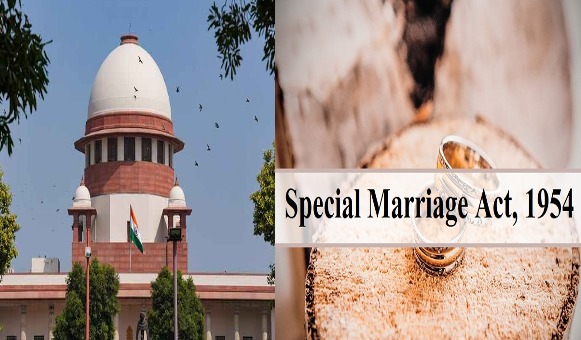
The Supreme Court stated on Thursday that laws like the Special Marriage Act were passed at a time when women lacked agency and that the public notice contemplated under the law inviting objections to an intended marriage is patriarchal and enables invasion of privacy.
The views were made by a Constitution Bench that included CJI DY Chandrachud, Justices Sanjay Kishan Kaul, S Ravindra Bhat, PS Narasimha, and Hima Kohli as it was hearing a slew of petitions that asked for the legal recognition of same-sex marriage.
The bench specifically considered Sections 5, 6, and 7 of the Special Marriage Act, which require marriage officials to display the public notice in a conspicuous location or on the notice board in their office 30 days prior to their marriage in order to invite or entertain objections.
The details of the notice include the couple’s names, phone numbers, date of birth, age, occupation, addresses, and other identifying information.
Senior Advocate Abhishek Manu Singhvi, representing the petitioners, stated that such rules do not exist in the personal laws of various religions.
He contended that the 30-day notice period for filing objections to the marriage infringes on the petitioners’ fundamental rights.
“Before a formal entry into marriage, you are invading my privacy by implying that I must declare my intention to marry to the entire world. This notice and objection component violates my personal, decisional autonomy. It is a relic of the Raj,” Singhvi emphasised.
“This is only based on patriarchy. These laws were enacted when women lacked agency,” Justice Bhat stated.
“This is like laying them open for invasion by society, including the Superintendent of Police, the District Magistrate, and so on,” the CJI stated.
Singhvi agreed and said that it should be overturned since it was completely disproportionate, discriminatory, and violated the right to privacy.
Interestingly, in August 2022, the Supreme Court refused to hear a PIL challenging the provisions of the Special Marriage Act requiring the disclosure of partners’ details in the public domain 30 days before the intended marriage.
In February of this year, the Kerala High Court ruled that the legislature should evaluate whether the rules were still necessary in this day and age.
The Delhi High Court observed last year that if two consenting adults decide to live together as husband and wife, no one, including their family members, has the right to interfere.




